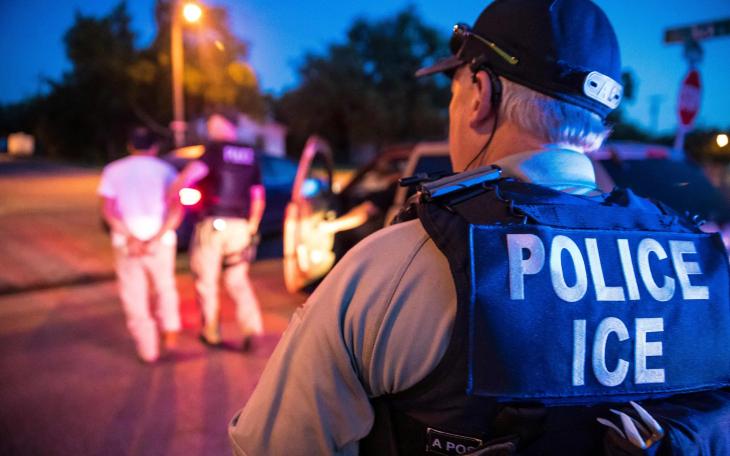By Carlos Nogueras Ramos, The Texas Tribune
ODESSA, TX — Rarely do Jeff Davis County commissioners’ meetings generate commotion in the county of fewer than 2,000 residents. A recent budget meeting was the exception.
David Flash paced around the room, lined with rows of wooden chairs inside this Far West Texas county courthouse, and took photos.
The independent publisher of the Big Bend Times regularly attends these meetings, documenting and recording live footage for the website and social media, where he has amassed 285,000 followers on Facebook.
His presence in the room — and county at large — has vexed officials.
At the June 27 meeting, the conflict escalated when sheriff deputy Adriana Ruiloba grabbed, handcuffed and forcibly removed Flash from the room after he tried to take her photo.
“Stop,” Ruiloba tells him.
“I’m not resisting,” he responds.
“Stop,” she can be heard saying again in video footage reviewed by The Texas Tribune. “Put your hands behind your back.”
In this news desert, Flash has appointed himself the region’s journalist. But to the highest-ranking elected officials of Jeff Davis, he is a nuisance with a camera.
County Judge Curtis Evans, the county’s chief executive, previously banned Flash from being within 300 feet of county officials, employees, and buildings in 2024 over claims of harassment and terroristic threats. Flash, who vehemently denies the accusations, said the county wants to deter him from drawing attention to them. A judge later lifted the ban, allowing Flash to return to work, including the recent budget meeting.
To news media and First Amendment experts, the conflict between Flash and the county is an issue about who gets to call themselves a journalist, the strict conduct they should abide by, and how local government officials, especially those who don’t regularly operate under a microscope, react to critical observers.
“The profession has to police itself,” said Renita Coleman, a professor of journalism and media at the University of Texas at Austin. “Because our reputation with the public is really all journalists have. Our credibility hinges upon us doing the right thing.”
Jeff Davis County did not respond to requests for comment. Neither did the sheriff’s office.
Born in Wichita Falls, Flash grew up in Houston and Bastrop. The 46-year-old also has a residence in Austin. In 2023, he moved to a 1,000-acre ranch in the Fort Davis area that he rented for a year. Flash has not stayed there since April 2024 out of fear of safety, he said. When he visits, he stays in a hotel.
Flash worked in several marketing, advertising and sales roles before founding the Big Bend Times in 2020. He holds a graduate degree in digital audience strategy from the Walter Cronkite School of Journalism and Mass Communication at Arizona State University, which he obtained in 2021. He is also the vice president of sales and marketing for a steam cleaning company, according to his LinkedIn page.
Before seeking a degree, Flash had no experience in the news business. At first, it was a hobby — a fun project, as Flash put it — that turned into a serious enterprise. In the Big Bend, this immense region in southwest Texas, where mountains meet the desert, Flash said he saw many residents deprived of information.
Once, he wrote about a county jail leaving trash on its premises. A local councilman, and a friend of his, told him that deputies were cleaning up that afternoon, which Flash attributed to his efforts.
“I’ve helped launch more than a dozen businesses,” Flash said. “This one happens to be journalism because that’s what the region needed.”
At least three other news organizations pay close attention to the area and its issues: Marfa Public Radio, a regional radio station, and the Big Bend Sentinel, which publishes both print and online. Both are headquartered 55 miles south in Marfa. There is also the Jeff Davis County Mountain Dispatch, a printed newspaper with little online activity.
Flash says he has stepped in to fill an information vacuum. The website features a variety of story types, ranging from job postings for restaurants and colleges to local football schedules. Other stories cover economic development issues. Flash writes most of the stories himself, especially those most critical of the local government. Last year, he earned $70,000 from two social media accounts he runs. Separately, he has raised $25,000 this year through calls for support to cover his mounting legal fees against the county.
Flash said he doesn’t follow traditional newsroom models.
“I don’t believe in following a legacy playbook as the only — or best — way to do responsible journalism anymore,” he said.
As traditional newsrooms, especially in rural parts of the U.S., shrink or close, journalists and others have tried to crack the code of providing high-quality information with less overhead. Few are successful.
Max Resnik, director of growth at Documenter Network City Bureau, a civic journalism program that has trained more than 4,000 residents across the country to document similar public meetings, said it does not matter whether Flash is a professional journalist. Every resident has the right to record, document and publish public meetings, he said.
“By preventing reporting from happening or discouraging reporting in those public meetings, it sends a chilling effect to other residents and reporters,” Resnik said.
He also pointed to the state’s open meeting handbook, which government officials and members of the public must comply with. Any person, the handbook says, “may record all or any part of an open meeting of a governmental body by means of a recorder, video camera, or other means of aural or visual reproduction.”
The document, which translates Texas’ transparency laws into plain English, additionally states that a governmental body may adopt reasonable rules to maintain order at a meeting, including the location of recording equipment, and how the recording is conducted. The rules “may not prevent or unreasonably impair a person from exercising a right.”
On June 27, Flash arrived at the courthouse before noon to document the commissioner’s court meeting. Flash set up a camera to stream the meeting live on social media in a corner. As the meeting was held, Flash paced around the room taking photos from several angles, video footage shows.
Sheriff Victor Lopez approached him about taking photos, saying it was interfering with his ability to listen to the hearing. The video footage showed Flash attempting to leave the meeting when Ruiloba, the deputy, confronted him again, telling him to “back off,” adding, “don’t come in my personal space.”
Shortly after, Flash leaves the room and continues to record from outside the premises, recounting the exchange that had just transpired. Flash, in the video, says he would walk back in to take a photo of Ruiloba. Once he does, and appears to point his camera toward the deputy, she responds by detaining him.
Shane O’Neal, an attorney Flash retained, said the county cited Flash with disorderly conduct. The citation did not specify which provision under Texas law for disorderly conduct was violated, including vulgar language, an offensive gesture, an unreasonable odor caused by chemical means, abuse or threats to another person, or unreasonable noise. A trial date has not been set.
“I don’t know what the allegation is,” O’Neal said.
Flash said there are no written rules on the premises regarding conduct in the courthouse, nor are they posted on the county’s website. If such rules exist, he did not violate them, he said. On the date of the incident, he said he complied with a request to place the camera in the back of the room. He said no one instructed him about how close or far he could take photos with a handheld camera.
Mary Angela Bock, an associate professor of journalism at UT-Austin, said that local government bodies should spell out the rules of decorum publicly. Otherwise, a person will not know whether they are breaking the rules, she said. Newsrooms employing journalists also require employees to adhere to policies that stipulate how to engage with the public. The same applies to photojournalists.
For journalists, such rules “matter a great deal,” Bock said. “Ethics are all we have to distinguish us from everybody else with a camera … anybody can pick up a phone, anybody can pick up a camera and publish it to the world. But a person who makes a point of operating according to ethical standards, that's what we have.”
In the days following the skirmish at the courthouse, Flash has transmitted live from his social media accounts every day, streaming from his car, urgent care offices and hotel rooms. He no longer feels safe in the county, he said. He thanks those who follow him for the moral and monetary support.
Early last week, he was headed to South America. He travels, he said, to expand his worldview, and that of his readers. And it’s earning him money. A photo he published on Facebook last year just earned him $100 because of the engagement it generated on the site.
“Headed out, but still in the fight. Still doing the reporting, the legal work, the fundraising shit, and all the other shit—because I don’t have the luxury of ignoring corruption just because I’m flying international,” he wrote on social media.
“The courthouse drama doesn’t stop, but neither do I.”
This article originally appeared in The Texas Tribune at https://www.texastribune.org/2025/07/11/west-texas-publisher-david-flash-jeff-davis-county-arrest/.
Subscribe to the LIVE! Daily
Required






Post a comment to this article here: